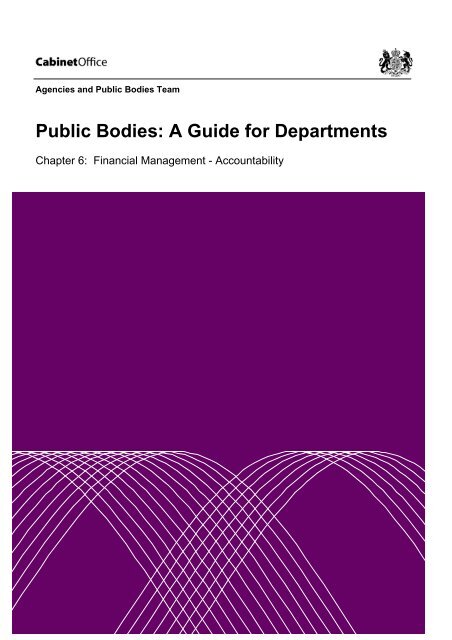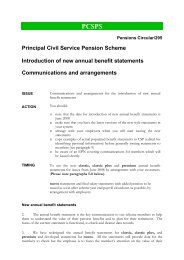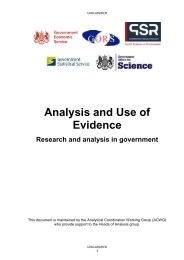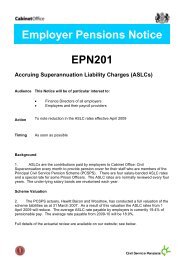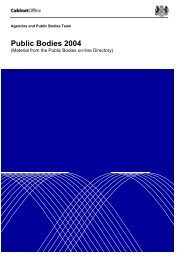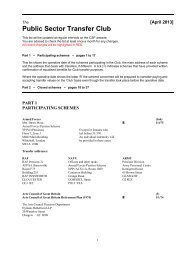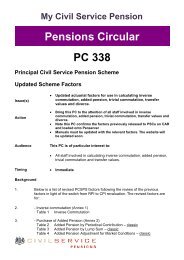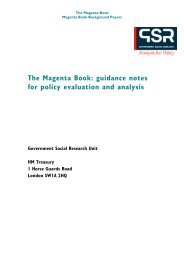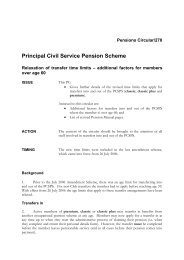Public Bodies: A Guide for Departments - Gov.UK
Public Bodies: A Guide for Departments - Gov.UK
Public Bodies: A Guide for Departments - Gov.UK
You also want an ePaper? Increase the reach of your titles
YUMPU automatically turns print PDFs into web optimized ePapers that Google loves.
Agencies and <strong>Public</strong> <strong>Bodies</strong> Team<br />
<strong>Public</strong> <strong>Bodies</strong>: A <strong>Guide</strong> <strong>for</strong> <strong>Departments</strong><br />
Chapter 6: Financial Management - Accountability
<strong>Public</strong> <strong>Bodies</strong>: A <strong>Guide</strong> <strong>for</strong> <strong>Departments</strong><br />
Chapter 6: Financial Management- Accountability<br />
FINANCIAL MANAGEMENT - ACCOUNTABILITY<br />
Contents<br />
1. Introduction<br />
2. Organisation<br />
2.1 Board Responsibility<br />
2.2 Accounting Officer<br />
2.3 Finance Posts<br />
3. Annual Reports and Accounts<br />
4. Per<strong>for</strong>mance Targets<br />
5. Internal Audit<br />
6. External Audit<br />
Annex A: NDPB Accounting Officer<br />
Appendix to Annex A: Induction Arrangements<br />
Annex B: Model letter of designation as a NDPB Accounting Officer<br />
Last Updated: June 2006
<strong>Public</strong> <strong>Bodies</strong>: A <strong>Guide</strong> <strong>for</strong> <strong>Departments</strong><br />
Chapter 6: Financial Management- Accountability<br />
1. Introduction<br />
Improved accountability is an important aim <strong>for</strong> all <strong>Public</strong> <strong>Bodies</strong>. As accountable<br />
units of management within the public sector, all <strong>Public</strong> <strong>Bodies</strong> are required to<br />
demonstrate that they are conducting their operations as economically, efficiently<br />
and effectively as possible. Annual reports and accounts are the main vehicles <strong>for</strong><br />
discharging this “stewardship” function and enabling Parliament, the taxpayer and<br />
customers to judge whether the body is securing value-<strong>for</strong>-money in its operations.<br />
2. Organisation<br />
2.1 Board Responsibility<br />
2.1.1 The Board of a <strong>Public</strong> Body has a collective responsibility <strong>for</strong> the<br />
proper conduct of the body’s affairs and <strong>for</strong> ensuring that staff maintain the strictest<br />
standards of financial propriety. Where the <strong>Public</strong> Body has been set up by<br />
statute, the Board has a duty to ensure that the requirements of propriety,<br />
regularity and value-<strong>for</strong>-money are met in its use of public funds.<br />
2.1.2 The Board must ensure compliance with any appropriate financial<br />
requirement laid upon them by the sponsor department in the management<br />
statement/ financial memorandum (MS/FM) or by other means.<br />
2.1.3 All public bodies are required to have in place a Code of Practice to<br />
which members should adhere. The Code should be publicly available and should<br />
set out the conduct expected of board members. Guidance on Codes of Practice<br />
<strong>for</strong> Board Members of <strong>Public</strong> <strong>Bodies</strong> and Model Codes of Practice <strong>for</strong> Board<br />
Members of Executive and Advisory NDPBs are available at:<br />
http://www.publicappointments.gov.uk/<br />
2.1.4 Sponsor <strong>Departments</strong> should be aware of the guidance on Corporate<br />
<strong>Gov</strong>ernance provided in Chapter 4: Setting up a New Executive NDPB – The<br />
Practical Tasks, paragraph 8. The Treasury Code of Practice on Corporate<br />
<strong>Gov</strong>ernance provides useful guidance on the role of the board and independent<br />
non-executive members.<br />
2.2 Accounting Officer<br />
2.2.1 The Chief Executive of the NDPB is normally designated as its<br />
Accounting Officer. The designation is usually made by the Permanent Secretary<br />
of the sponsor department, the Principal Accounting Officer, although an Additional<br />
Accounting Officer within the sponsor department may do so if they have<br />
responsibility <strong>for</strong> the body in question. The letter of designation, which should be<br />
accompanied by a copy of the NDPB Accounting Officer Memorandum and the<br />
Treasury guidance document Regularity, Propriety and Value <strong>for</strong> Money,<br />
http://www.hm-treasury.gov.uk/media/28A/48/Reg_Prop_and_VfM-<br />
November04.pdf, should make clear that the designation can be withdrawn in<br />
- 1 - Last updated: June 2006
<strong>Public</strong> <strong>Bodies</strong>: A <strong>Guide</strong> <strong>for</strong> <strong>Departments</strong><br />
Chapter 6: Financial Management- Accountability<br />
certain circumstances. See Annex A of this document <strong>for</strong> further in<strong>for</strong>mation.<br />
Annex B provides a model Designation Letter endorsed by HMT <strong>for</strong> use by sponsor<br />
departments. The Accounting Officer’s designation letter should be copied to the<br />
Comptroller and Auditor General (C&AG), the clerk to the Committee of <strong>Public</strong><br />
Accounts (PAC) and the Treasury Officer of Accounts.<br />
2.2.2 Please refer to the following Treasury guidance <strong>for</strong> detailed advice<br />
about the responsibilities of the Accounting Officer including appearance be<strong>for</strong>e the<br />
<strong>Public</strong> Accounts Committee:<br />
http://www.hmtreasury.gov.uk/documents/financial_management/governance_government/aaa_a<br />
ccountingrole_index.cfm<br />
The <strong>Gov</strong>ernment’s Financial Reporting Manual provides a model Statement of<br />
Accounting Officer’s responsibilities:<br />
http://www.financial-reporting.gov.uk/ANNEX 3 ACCOUNTING OFFICERS<br />
RESPONSIBILITIES.pdf<br />
2.3 Finance Posts<br />
<strong>Public</strong> <strong>Bodies</strong> will normally appoint a finance officer or finance director whose<br />
duties are likely to include advising senior managers on financial policy and<br />
management and to run the financial management systems. The post will<br />
generally be separate from the management line which has responsibility <strong>for</strong><br />
budgeted money and manpower.<br />
3. Annual Reports and Accounts<br />
3.1 Executive NDPBs produce annual reports and accounts that are either<br />
<strong>for</strong>mally laid be<strong>for</strong>e Parliament or placed in the Library of the House of Commons.<br />
In the case of NDPBs with their own founding legislation, there should be provision<br />
<strong>for</strong> the preparation of an annual report and of annual accounts in accordance with<br />
directions issued by the Secretary of State with the approval of the Treasury, the<br />
audit of the accounts and their presentation to Parliament. For 2005/06 onwards,<br />
the statutory requirement <strong>for</strong> the preparation of an annual report will be satisfied by<br />
the preparation of a Management Commentary which <strong>for</strong>ms part of the accounts<br />
(see Chapter 7 of the government Financial Reporting Manual www.financialreporting.gov.uk.<br />
The Treasury should be consulted on the <strong>for</strong>mat of the direction.<br />
In straight<strong>for</strong>ward cases, the direction will require compliance with the <strong>Gov</strong>ernment<br />
Financial Reporting Manual, but the direction may need to refer to any unusual<br />
aspect of the accounting or reporting arrangements.<br />
3.2 If this is adopted, obtaining Treasury approval is straight<strong>for</strong>ward. However,<br />
due allowance must be made <strong>for</strong> any discussion over any unusual aspect of the<br />
accounting or reporting arrangements. <strong>Public</strong> <strong>Bodies</strong> established under the<br />
Companies Acts prepare their accounts in accordance with the requirements of the<br />
Companies Acts.<br />
- 2 - Last updated: June 2006
<strong>Public</strong> <strong>Bodies</strong>: A <strong>Guide</strong> <strong>for</strong> <strong>Departments</strong><br />
Chapter 6: Financial Management- Accountability<br />
3.3 Where a NDPB is to be set up under statutory powers the legislation should<br />
normally provide <strong>for</strong> the body’s audited accounts to be laid be<strong>for</strong>e Parliament by a<br />
specified date. This is not always the case as far as the Annual Report is<br />
concerned and when departments are seeking new legislation which covers<br />
accounts, consideration should be given to making provision <strong>for</strong> the preparation<br />
and presentation to Parliament of an Annual Report together with the Annual<br />
Accounts.<br />
3.4 The accounts should be produced on an accruals basis following, as far as<br />
appropriate, private sector practice based on generally accepted accounting<br />
practice in the <strong>UK</strong> (<strong>UK</strong> GAAP), i.e. the requirements of the Companies Act and on<br />
the accounting standards issued or adopted by the Accounting Standards Board.<br />
The accounting and reporting requirements are set out in:<br />
http://www.hm-treasury.gov.uk./media/754/8C/ndpb_guidance_261104.pdf<br />
3.5 The incumbent Accounting Officer of the public body will normally be<br />
expected to sign its accounts. The <strong>Public</strong> Accounts Committee attaches great<br />
importance to the responsibilities of the signatories of public accounts prepared by<br />
public bodies and any of them are liable to be summoned be<strong>for</strong>e the Committee,<br />
alongside the departmental Accounting Officer concerned. They should there<strong>for</strong>e<br />
be notified by the sponsor department of that liability.<br />
3.6 Advisory and Tribunal NDPBs do not normally prepare separate accounts,<br />
but are accounted <strong>for</strong> as part of their sponsoring department’s resource account.<br />
They should, however, prepare an annual report that <strong>for</strong> the large majority of<br />
Advisory NDPBs should be prepared in a proportionate way and need only be one<br />
or two pages long. It might include the following:<br />
3.6.1 a brief history of the body;<br />
3.6.2 terms of reference <strong>for</strong> the body;<br />
3.6.3 a description of how the body's work supports the government's<br />
objectives and policies;<br />
3.6.4 details of membership of the body, including any changes which have<br />
taken place during the year;<br />
3.6.5 details of the remuneration, if any, of the chair and members;<br />
3.6.6 the frequency of meetings;<br />
3.6.7 a list of reports issued during the year and a summary of the reports if<br />
practicable; and<br />
3.6.8 a point of contact in the sponsor department or body from where<br />
further in<strong>for</strong>mation about the body can be obtained.<br />
- 3 - Last updated: June 2006
<strong>Public</strong> <strong>Bodies</strong>: A <strong>Guide</strong> <strong>for</strong> <strong>Departments</strong><br />
Chapter 6: Financial Management- Accountability<br />
3.7 It is recommended that the Annual Report is laid in the House Libraries and<br />
the department should consider making a ministerial statement if deemed<br />
appropriate. Alternatively, the requirement to publish an annual report could be<br />
met by including a section in the sponsor department's report. Please note,<br />
Advisory NDPBs with a separate legal identity should comply with the guidance<br />
relating to Executive NDPBs in respect of accountability requirements.<br />
4. Per<strong>for</strong>mance targets<br />
4.1 All NDPB Annual Reports should provide full details of the extent to which<br />
financial and other per<strong>for</strong>mance targets have been achieved over the past year.<br />
4.2 All NDPB’s key financial and quality of service targets should be published<br />
be<strong>for</strong>e the start of the period they are intended to cover. NDPBs should agree<br />
with their sponsor department how this should be done. See Chapter 7: Financial<br />
Management – Planning, Funding and Control <strong>for</strong> further in<strong>for</strong>mation.<br />
5. Internal audit<br />
5.1 NDPBs should make arrangements <strong>for</strong> internal audit in accordance with the<br />
Treasury’s <strong>Gov</strong>ernment Internal Audit Standards (GIAS). The sponsoring<br />
department in its turn is required to ensure that an NDPB makes effective<br />
arrangements <strong>for</strong> internal audit, and should arrange <strong>for</strong> its own internal auditors to<br />
have access to the NDPB. Where practicable an NDPB should have its own<br />
internal audit unit but may buy in a service from a private firm or sponsor<br />
department provided this complies with GIAS, and does not lead to a conflict of<br />
loyalties. Internal audit should maintain links with the NDPB’s and other review<br />
services as well as with the sponsor department’s own internal audit unit.<br />
In<strong>for</strong>mation on GIAS is available at:<br />
http://www.hmtreasury.gov.uk/documents/financial_management/governance_government/pss_a<br />
ud_gias.cfm<br />
5.2 The NDPB should set up an Audit Committee as a committee of its Board in<br />
accordance with the Cabinet Office’s Guidance on Codes of Practice <strong>for</strong> Board<br />
Members of <strong>Public</strong> <strong>Bodies</strong> and the Treasury’s Audit Committee Policy Principles<br />
which are set out in the Audit Committee Handbook. The Handbook is available at:<br />
http://www.hmtreasury.gov.uk/documents/financial_management/governance_government/pss_a<br />
ud_achandbook.cfm<br />
5.3 A checklist <strong>for</strong> evaluating the audit committee arrangements is available<br />
from the National Audit Office:<br />
http://www.nao.org.uk/guidance/checklists/auditcommittee_checklist.pdf<br />
5.4 The NDPB’s Accounting Officer is personally responsible <strong>for</strong> making<br />
suitable arrangements <strong>for</strong> the provision of internal audit in a manner which<br />
represents best value <strong>for</strong> money.<br />
- 4 - Last updated: June 2006
<strong>Public</strong> <strong>Bodies</strong>: A <strong>Guide</strong> <strong>for</strong> <strong>Departments</strong><br />
Chapter 6: Financial Management- Accountability<br />
5.5 If requested to do so the sponsor department should assist in setting up<br />
such arrangements, especially where the NDPB does not have the resources to<br />
provide a comprehensive internal audit service that con<strong>for</strong>ms to GIAS.<br />
5.6 The sponsor department should also have a right of access so that its own<br />
internal auditors or other representatives can carry out any additional work required<br />
to provide an assurance to the department’s Accounting Officer on the exercise of<br />
his responsibilities in relation to the NDPB.<br />
5.7 The sponsor department must obtain details of the internal audit<br />
arrangements and monitor the effectiveness of a NDPB’s internal audit provision.<br />
The Management Statement and Financial Memorandum should set out the<br />
arrangements <strong>for</strong> the NDPB to provide to the department (regularly or on request)<br />
in<strong>for</strong>mation about the NDPB’s internal audit strategy, the annual programme, and<br />
copies of final audit reports selected by the department, including the NDPB’s<br />
Head of Internal Audit’s opinion on risk management, control and governance.<br />
Arrangements should be made by sponsor departments <strong>for</strong> their own internal<br />
auditors to see these documents<br />
6. External audit<br />
6.1 The expenses of most advisory and judicial bodies will be audited by the<br />
Comptroller & Auditor General (C&AG) as they are borne on the Estimates of<br />
sponsoring departments and included as part of the department’s resource<br />
accounts. The C&AG has been given powers to audit all executive NDPBs except<br />
<strong>for</strong> the time being those established under the Companies Act.<br />
6.2 The C&AG is separately empowered to carry out value-<strong>for</strong>-money<br />
examinations of NDPBs which meet the criteria in the National Audit Act 1983,<br />
irrespective of whether or not he audits those NDPBs accounts.<br />
6.3 The auditing arrangements below reflect the decisions announced in the<br />
<strong>Gov</strong>ernment’s response of March 2002 to Lord Sharman’s review of audit and<br />
accountability in central government.<br />
Appointment of Auditors<br />
6.3.1 New Executive NDPBs that are being set up with their own founding<br />
legislation, the statute should provide <strong>for</strong> the appointment of the C&AG as the<br />
external auditor.<br />
6.3.2 There is different treatment <strong>for</strong> NDPBs that are set up under old<br />
legislation that does not include statutory provision <strong>for</strong> C&AG audit, or <strong>for</strong> bodies<br />
that have been or are being reclassified by the Cabinet Office as NDPBs. In these<br />
circumstances, the Treasury has the power under the <strong>Gov</strong>ernment Resources and<br />
Accounts Act 2000 to give the C&AG statutory audit responsibility by taking an<br />
Affirmative Order (SI) through Parliament. <strong>Departments</strong> should speak to the<br />
relevant Treasury contacts <strong>for</strong> further in<strong>for</strong>mation.<br />
- 5 - Last updated: June 2006
<strong>Public</strong> <strong>Bodies</strong>: A <strong>Guide</strong> <strong>for</strong> <strong>Departments</strong><br />
Chapter 6: Financial Management- Accountability<br />
6.3.3 For the time being, NDPBs established under the Companies Acts<br />
will continue to appoint their own external auditors in accordance with the<br />
requirements of the Companies Acts. However, once the Company Law Re<strong>for</strong>m<br />
Bill comes into <strong>for</strong>ce, the C&AG will be eligible to be appointed auditor of NDPB<br />
companies and NDPB subsidiaries that are companies.<br />
6.3.4 In approaching the audit of a NDPB, the C&AG will consult the<br />
sponsoring department and other relevant stakeholders as well as the NDPB itself<br />
and consider their views on whom – the National Audit Office or a commercial<br />
auditor – should undertake the audit. The final decision will rest with the C&AG but<br />
he will of course explain its basis.<br />
6.3.5 Sponsoring departments have a range of interests in the audit of their<br />
NDPBs. Where they have hitherto appointed the auditor they will have agreed, in<br />
advance of the audit, requirements which might include clarity as to what is being<br />
covered by the audit and appropriate documentation surrounding it, and the audit<br />
reports and any other outputs will have been addressed to the sponsoring<br />
departments. This has enabled the departments to require, as part of the audit, an<br />
assurance on the financial systems within the NDPB.<br />
6.3.6 The C&AG has made clear that as statutory auditor of an NDPB he<br />
will share with the sponsoring department and other relevant stakeholders the kind<br />
of in<strong>for</strong>mation noted above, subject to appropriate agreement between himself and<br />
the department, and also between the department and the NDPB, to allow such<br />
disclosure. These arrangements will normally include agreement that in<strong>for</strong>mation<br />
identified during the audit process will be shared with the department at the end of<br />
the audit. Such arrangements will apply in particular to issues which impact on the<br />
department’s responsibilities in relation to financial systems within the NDPB.<br />
6.3.7 Where the C&AG is the statutory auditor, the management letter is<br />
addressed to the NDPB and the audit certificate is addressed to Parliament.<br />
Where asked, however, the C&AG will provide departments with Regulatory<br />
Compliance Reports and other similar reports that the departments may request at<br />
the commencement of the audit and which are compatible with the independent<br />
auditor’s role.<br />
6.3.8 For NDPBs which are established under the Companies Acts and<br />
which there<strong>for</strong>e <strong>for</strong> the time being appoint their own external auditors, the<br />
Management Statement and Financial Memorandum needs to provide <strong>for</strong> audit<br />
reports to be supplied to the sponsor department.<br />
Right of Access to Documents<br />
6.4 Under the <strong>Gov</strong>ernment Resources and Accounts Act 2000 the C&AG has,<br />
<strong>for</strong> the purposes of statutory audit, a right of access to documents held or<br />
controlled by the audited NDPB itself, as well as to relevant documents held both<br />
by recipients of grants from the NDPB and by the NDPB’s contractors and<br />
subcontractors.<br />
- 6 - Last updated: June 2006
<strong>Public</strong> <strong>Bodies</strong>: A <strong>Guide</strong> <strong>for</strong> <strong>Departments</strong><br />
Chapter 6: Financial Management- Accountability<br />
6.5 In addition, <strong>for</strong> the purposes of conducting a value <strong>for</strong> money study of a<br />
NDPB the C&AG has access to relevant documents held by the bodies noted<br />
above (i.e. recipients of grants from the NDPB and the NDPB’s contractors and<br />
subcontractors).<br />
- 7 - Last updated: June 2006
<strong>Public</strong> <strong>Bodies</strong>: A <strong>Guide</strong> <strong>for</strong> <strong>Departments</strong><br />
Chapter 6: Financial Management- Accountability<br />
Annex A<br />
ACCOUNTING OFFICERS<br />
Introduction<br />
1. The decision to appoint a Chief Executive of a NDPB normally rests with the<br />
Board. In making the appointment, the Board will be acting in the knowledge<br />
that the Chief Executive will have to carry the responsibilities of the Accounting<br />
Officer, but the decision to designate the chief executive as the NDPB<br />
Accounting Officer is the responsibility of the sponsor department's Accounting<br />
Officer alone. For this reason, it is highly desirable that the departmental<br />
Accounting Officer, or his representative, should be involved in the process of<br />
appointing the Chief Executive and consulted about any actions that might lead<br />
to his or her removal as such.<br />
2. In June 1995 the Permanent Secretary of the Department of National Heritage,<br />
as the Department's Accounting Officer, withdrew Accounting Officer status<br />
from the Chief Executive of the National Heritage Memorial Fund (NHMF). As a<br />
direct consequence, the NHMF trustees then dismissed the Chief Executive.<br />
Against that background, and with the aim of preventing a re-occurrence of the<br />
NHMF case, this note discusses the steps that departmental Accounting<br />
Officers should take to increase the NDPB Accounting Officers' understanding<br />
of their responsibilities. Although the expectation is that cases such as the<br />
NHMF one should be extremely rare, the note also sets out the procedures a<br />
departmental Accounting Officer should follow if he or she faces a similar<br />
decision in the future. These are based on those followed in the NHMF case.<br />
Increasing NDPB Accounting Officers' understanding of their responsibilities<br />
3. Departmental accounting officers should:<br />
• make it clear in the letter designating a NDPB Accounting Officer, which<br />
should enclose the Treasury memorandum 'The Responsibilities of an<br />
NDPB Accounting Officer' 1 , that their status can be withdrawn in certain<br />
circumstances;<br />
• make sure that Accounting Officers in NDPBs are well briefed on their<br />
responsibilities. Accounting officers should normally be required to attend<br />
the National School of <strong>Gov</strong>ernment course 'An Introduction to <strong>Public</strong><br />
Accountability <strong>for</strong> Chief Executives', which is specifically designed <strong>for</strong> newly<br />
1 Annex 8.2 of <strong>Gov</strong>ernment Accounting<br />
- 8 - Last updated: June 2006
<strong>Public</strong> <strong>Bodies</strong>: A <strong>Guide</strong> <strong>for</strong> <strong>Departments</strong><br />
Chapter 6: Financial Management- Accountability<br />
appointed Chief Executives of Executive Agencies and NDPBs or to<br />
undertake similar training provided by the department itself. The 'menu' of<br />
the National School of <strong>Gov</strong>ernment courses includes accountability,<br />
<strong>Gov</strong>ernment Accounting, regularity and propriety, accounting officers, the<br />
roles of Parliament, Treasury, C&AG and PAC in financial control, corporate<br />
governance and current issues on standards, ethics etc in the delivery of<br />
public services;<br />
• newly designated Accounting Officers should discuss their role with either<br />
the Permanent Secretary or the Principal Finance Officer of the sponsor<br />
department;<br />
• as standard practice, newly designated Accounting Officers should have a<br />
general discussion with staff in NAO to obtain a better understanding of its<br />
role. This will augment the session on the role of the C&AG, which <strong>for</strong>ms<br />
part of the course above. A talk with the NAO would be worthwhile even in<br />
those cases where they are not the financial auditors of the NDPB, since<br />
NAO still have the right to conduct value <strong>for</strong> money audits in such bodies;<br />
• if a department is designating as Accounting Officer someone from outside<br />
the civil service, consider the need <strong>for</strong> additional induction training (see<br />
Appendix A); and<br />
• where this has not been done already, draw the attention of Accounting<br />
Officers in NDPBs, who have not been <strong>for</strong>mally designated as such, to the<br />
Treasury memorandum.<br />
Procedures <strong>for</strong> handling the withdrawal of accounting officer status in an<br />
NDPB<br />
4. Circumstances leading to the withdrawal of Accounting Officer status are likely<br />
to be ones in which the Board of the NDPB would also wish to take disciplinary<br />
action which may lead to dismissal of the individual concerned. There may be<br />
circumstances in which the Board of a NDPB might take the initial decision to<br />
suspend the Chief Executive, with suspension or withdrawal of Accounting<br />
Officer status following. Where the Board consults the Department first and<br />
then takes the appropriate investigative and disciplinary action (including<br />
prompt suspension if necessary), separate departmental action to consider<br />
withdrawal of Accounting Officer status will not be required, as withdrawal will<br />
be the automatic consequence of the Board's action. Where separate action is<br />
needed the following procedures will be followed.<br />
- 9 - Last updated: June 2006
<strong>Public</strong> <strong>Bodies</strong>: A <strong>Guide</strong> <strong>for</strong> <strong>Departments</strong><br />
Chapter 6: Financial Management- Accountability<br />
5. Although the relationship between a departmental Accounting Officer and the<br />
Accounting Officer of a NDPB is governed by public rather than employment<br />
law, the departmental Accounting Officer has a duty to act fairly and rationally<br />
when making a determination which affects the Accounting Officer of the<br />
NDPB, notably as to his or her continued employment. If the loss of Accounting<br />
Officer status leads to dismissal, the dismissing employer will need to show, as<br />
a matter of employment law, that he acted reasonably in all the circumstances<br />
and these may include the fairness of any decision to remove that status.<br />
6. If a department has more than one Accounting Officer, it may be possible to<br />
offer an appeal; the original decision could be taken by an additional accounting<br />
officer, leaving the principal accounting officer to hear any appeal. Otherwise<br />
there is no scope <strong>for</strong> an appeal.<br />
The procedures<br />
7. If a NDPB Chair is considering the suspension of a Chief Executive, the Chair<br />
should consult his finance and internal audit committees.<br />
8. If a departmental Accounting Officer is considering the withdrawal of<br />
Accounting Officer status from the Chief Executive of a NDPB, he or she will<br />
normally:<br />
• advise the Chief Executive and the Chair of the board immediately of the<br />
concern, the procedures that will be followed and the possible<br />
consequences. The Chairman should be in<strong>for</strong>med of all subsequent<br />
developments;<br />
• if the allegations are sufficiently serious to require the suspension of the<br />
Accounting Officer, work closely with the board of trustees to identify a<br />
temporary replacement. The decision on the designation, however, rests<br />
with the departmental Accounting Officer;<br />
• invite someone from the sponsor department to carry out an initial<br />
investigation. The Chief Executive has the right to legal or trade union<br />
representation;<br />
• allow the Chief Executive the opportunity to comment on the results of the<br />
initial investigation;<br />
• in<strong>for</strong>m the Chair of the results of the initial investigation and the Chief<br />
Executive's response. and allow him or her the opportunity to comment on<br />
them;<br />
- 10 - Last updated: June 2006
<strong>Public</strong> <strong>Bodies</strong>: A <strong>Guide</strong> <strong>for</strong> <strong>Departments</strong><br />
Chapter 6: Financial Management- Accountability<br />
• consider all the evidence, advise the Chair of the probable decision, and<br />
take account of any representations he or she may make; and<br />
• <strong>for</strong>mally advise the Chief Executive and the Chair of the decision.<br />
9. The department has a duty to report such matters to the Treasury and to the<br />
National Audit Office, or the Department of Finance and Personnel and the<br />
Northern Ireland Audit Office in Northern Ireland, and to respond to any<br />
questions they may put. The department also has to respond to any<br />
subsequent questioning by the <strong>Public</strong> Accounts Committee. The departmental<br />
Accounting Officer might also wish to draw the attention of other departments<br />
to what has taken place to help prevent a re-occurrence elsewhere, but will not<br />
otherwise discuss the case publicly.<br />
Cabinet Office<br />
July 1999 (updated June 06)<br />
- 11 - Last updated: June 2006
<strong>Public</strong> <strong>Bodies</strong>: A <strong>Guide</strong> <strong>for</strong> <strong>Departments</strong><br />
Chapter 6: Financial Management- Accountability<br />
Appendix to Annex A<br />
Induction arrangements <strong>for</strong> senior staff who are new to the Civil Service and<br />
other public offices including NDPBs<br />
Training<br />
Training <strong>for</strong> senior staff (chief executives and others) joining the <strong>Gov</strong>ernment from<br />
outside the Civil Service is available from the National School of <strong>Gov</strong>ernment. The<br />
School provides the following programmes:<br />
• Senior Entrants Programme <strong>for</strong> staff at Grade 7 (or equivalent) and above<br />
who join the Civil Service from outside;<br />
• ‘An Introduction to <strong>Public</strong> Accountability <strong>for</strong> Chief Executives’ – designed <strong>for</strong><br />
new Accounting Officers and those who support them in their role e.g.<br />
Finance Directors. It is relevant to those recently appointed from outside the<br />
Civil Service and also those who wish to update themselves and focus on<br />
their new responsibilities.<br />
• Individual training packages tailored to the particular needs of Chief<br />
Executives or equivalent (arranged through the Executive Development<br />
Unit);<br />
• ‘Appearing be<strong>for</strong>e the <strong>Public</strong> Accounts Committee’ provides tailored<br />
preparation <strong>for</strong> Accounting Officers and their supporting witnesses when<br />
required to appear be<strong>for</strong>e the Committee;<br />
• Training <strong>for</strong> newly-appointed members of the Boards of Non-Departmental<br />
<strong>Public</strong> <strong>Bodies</strong> which senior staff may attend, run both as open courses on<br />
the School's own premises and in versions tailored to the needs of single<br />
client organisations. The course covers matters of accountability, ethics and<br />
propriety, and the role of the Accounting Officer.<br />
Contact Details<br />
For more in<strong>for</strong>mation please contact the Course Director, Jane Foulsham<br />
(jane.foulsham@nationalschool.gsi.gov.uk) or the Course Administrator, Jeff<br />
Linsdell on 01344 634622 (jeff.linsdell@nationalschool.gsi.gov.uk).<br />
- 12 - Last updated: June 2006
<strong>Public</strong> <strong>Bodies</strong>: A <strong>Guide</strong> <strong>for</strong> <strong>Departments</strong><br />
Chapter 6: Financial Management- Accountability<br />
Mentoring<br />
The availability of in<strong>for</strong>mal advice from an experienced person in the early stages<br />
of a public service appointment, and later as new issues arise, may add value and<br />
directness to <strong>for</strong>mal training and guidance material. <strong>Departments</strong> and NDPBs will<br />
wish to consider this.<br />
- 13 - Last updated: June 2006
<strong>Public</strong> <strong>Bodies</strong>: A <strong>Guide</strong> <strong>for</strong> <strong>Departments</strong><br />
Chapter 6: Financial Management- Accountability<br />
- 14 - Last updated: June 2006<br />
Annex B<br />
MODEL LETTER OF DESIGNATION AS A NDPB ACCOUNTING OFFICER – AS<br />
ENDORSED BY HM TREASURY MARCH 2006<br />
I am writing to <strong>for</strong>mally appoint you as the Accounting Officer <strong>for</strong> [name of body] <strong>for</strong><br />
the grant-in-aid account of that body from [date].<br />
I enclose a copy of the Treasury Memorandum “The Responsibilities of an NDPB<br />
Accounting Officer” which explains your relationship with me as principal<br />
Accounting Officer <strong>for</strong> [name of department], and the specific responsibilities that<br />
are placed on you as Accounting Officer <strong>for</strong> [name of body].<br />
Please also refer to the Treasury handbook “Regularity, Propriety and Value <strong>for</strong><br />
Money (Nov 2004)” which is designed primarily <strong>for</strong> Accounting Officers and which<br />
explains the high standards of propriety expected of those involved in the<br />
stewardship of public funds, and the importance of public accountability. The<br />
electronic version of the handbook is available from the Treasury website:<br />
http://www.hmtreasury.gov.uk/documents/financial_management/governance_government/pss_a<br />
ud_regprop04.cfm<br />
These themes are further developed in the National School of <strong>Gov</strong>ernment training<br />
course An Introduction to <strong>Public</strong> Accountability <strong>for</strong> Chief Executives. It is essential<br />
that you receive training at the earliest opportunity. You should initially contact Jeff<br />
Linsdell (Programme Manager) at the School on 01344 634622. I should be<br />
grateful if you will write and confirm when you have completed this training.<br />
I should also explain that your designation as Accounting Officer may be withdrawn<br />
if I conclude that you are no longer a fit person to carry out the responsibilities of<br />
an Accounting Officer or that it is otherwise in the public interest that your<br />
designation be withdrawn. I would not take such a decision without full and careful<br />
examination of the facts which you would have a suitable opportunity to contribute<br />
to and to add your viewpoint. Nor would I take such a decision without giving your<br />
Chair a full account of my reasons as well as a chance to make representations.<br />
[Your Chair has a note detailing the procedures I would follow in these<br />
circumstances.] Withdrawal of Accounting Officer status would obviously bring into<br />
question your fitness <strong>for</strong> the position of Chief Executive generally.<br />
If you ever have any concerns about the course of action you should follow, please<br />
do not hesitate to contact me or my colleagues here.<br />
A copy of this letter (without enclosures) goes to your Chair, to [ ] the Comptroller<br />
& Auditor General, to the Clerk of the <strong>Public</strong> Accounts Committee, to [ ] Principal,<br />
National School of <strong>Gov</strong>ernment and to the Treasury Officer of Accounts.<br />
[Signed: Permanent Secretary]


